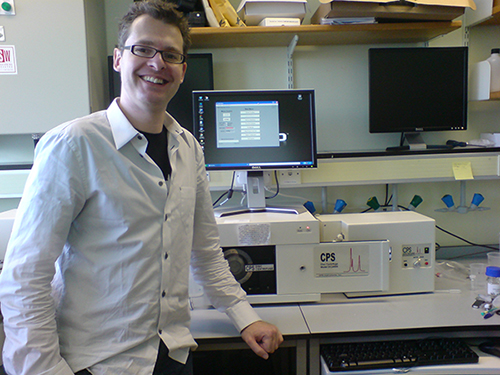University of Warwick selects CPS Disc Centrifuge for polymer colloid characterisation
 University of Warwick selects CPS Disc Centrifuge for polymer colloid characterisation
University of Warwick selects CPS Disc Centrifuge for polymer colloid characterisation
26th March 2010: Analytik is pleased to announce that the Department of Chemistry at the University of Warwick has selected the CPS Disc Centrifuge, model DC 24000, to support their investigations in supracolloidal chemistry.
The Warwick team’s research, led by Associate Professor of Polymer Chemistry, Dr Stefan A. F. Bon, is focussing on the synthesis of complex and functional colloidal building blocks into larger supracolloidal structures. The technology behind the CPS instrument, differential centrifugal sedimentation (DCS), allows the group to investigate the particle size distribution and population of both polymer and inorganic colloids. Data from the DC24000 provides key information to allow the design of novel routes for particle assembly into larger structures, gaining insight into how these processes work. Applications of the fabrication of these structures include coatings and adhesives, food, agriculture, lab-on-a-chip devices and sensors.
Dr Bon’s Research Group uses a comprehensive array of characterisation techniques including particle sizing by DCS, dynamic and static light scattering, particle tracking, and microscopy techniques such as SEM/TEM and AFM. The CPS Disc Centrifuge is extremely useful to their studies delivering routine ultra high resolution analysis of nanoparticle populations down to 2 nm and differing in size by as little as 2%.
Catheline Colard, Roberto Teixeira and Stefan Bon have recently published a paper in the ACS journal Langmuir entitled ‘Unraveling Mechanistic Events in Solids-Stabilized Emulsion Polymerization by Monitoring the Concentration of Nanoparticles in the Water Phase’. The paper describes how the CPS DC24000 showed ‘exemplary reproducibility’ when monitoring nanoparticle concentrations, proving the instrument to be an ‘invaluable tool for determining key features of the polymerization process’.
When the principal author, Catheline Colard, was asked to identify any further benefits of the CPS DC24000, she explained ‘the amazing resolution of the CPS Disc Centrifuge allowed us to analyse nanoparticle structures with very little size difference’. Dr Stefan Bon added ‘The strength of the disc centrifuge technique over other particle sizing methods is that it can distinguish small differences in particle size populations in a relative easy manner’.
For access to the Langmuir paper visit: pubs.acs.org/doi/abs/10.1021/la904817f
To view more from the Bon Polymer Colloids Group visit: http://bonlab.squarespace.com/
Cambridge-based Analytik are exclusive UK and Ireland distributors of the CPS Disc Centrifuge. To learn more about the ultra-high resolution particle sizer, visit our nanoparticle size analysis page.


